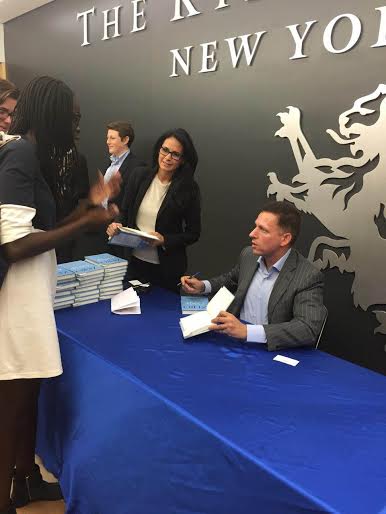Co-founder of Paypal speaks on entrepreneurship, investment at King's
Peter Thiel, co-founder of Paypal and first outside investor in Facebook, spoke to a full crowd at The King’s College on October 9. Thiel delivered a lecture on the developing world to a full house of students, faculty, staff and others. After his lecture, he answered questions from Gregory Thornbury, the president of King's.

Despite rapid increases in globalization over the last 40 years, Thiel lamented the decreases in technological progress that have taken place. The developing world has not focused enough on furthering science since 1971, Thiel argued. We are not in a scientific age. "Society is dominated by a hostility of all things scientific and technological," said Thiel. Just look at what Hollywood is producing—top blockbuster films for the past few summers have been very anti-technology, like Avatar, Terminator, Elysium, etc. “[This anti-technology] has become the dominant ethos in our society,” said Thiel.
“Entrepreneurship,” said Thiel, “is very unscientific.” He argued that there is no formula for success - the next Mark Zuckerberg will not create a social networking site, and the next Larry Page or Sergey Brin will not make a search engine.
“Successful people find value in unexpected places, and they do this by thinking about business from first principles instead of from formulas," said Thiel.
A favorite prompt he gives job candidates and founders of companies seeking an investment is: "Tell me something that's true, that almost nobody agrees with you on."
The question is tougher than one might initially think. Not only is the knowledge taught in school universally agreed upon, but anyone who answers must say something he or she knows is unpopular.
Thiel discussed a few things he believes to be true that most people disagree with him on. First, how we often use capitalism and competition interchangeably, yet “capitalism and competition are antonyms. If you want to compete, open a restaurant in Manhattan,” said Thiel. Google, however, hasn’t had any serious competition in search since 2002. It is tough to tell how much of the world is monopolistic and how much is truly competitive because monopolists and competitors have distorted perspectives.
Why is that? “There’s an intellectual and psychological reason,” said Thiel. Intellectually, people inside competitive companies often underestimate how competitive they are, and conversely, Larry Page is not boasting about how powerful a monopoly Google is. Psychologically, people are attracted to competition. We naturally want to win and to be the best. “Our identity gets wrapped up in the competition,” said Thiel. The good thing about competition is that one does get better (e.g., grades) and improve their performance, but one is also at risk of losing perspective and focusing on destroying the other side.
Thiel explained when he’s listening to a pitch from a start-up, he’s cautious whenever he hears them use buzzwords like a disruptive new system for cloud storage. “Buzzwords are a tell like in poker that a person is bluffing.”
During the Q&A, President Thornbury and Thiel discussed technology verses globalization, and the overlap in the future of technology and the classics, like PPE.
One of the audience members asked, “How have you developed a sense of what is worth investing in and how do you decide?” Thiel responded that there’s three things he looks for:
- People: there must be positive internal dynamics
- Technology: does the idea work?
- Business strategy: is the idea unique?
Thiel concluded his lecture with a question of his own: “How do we develop our developed world? That will be an important question for the years to come.”
Thiel was born in Germany and attended Stanford University (1989) and Standford Law School (1992). Thiel is the co-founder of both Paypal and Palantir. He previously served as the CEO of Paypal and now serves as the chairman of Palantir. He currentlyserves as president of Clarium Capital, a global macro hedge fund. Thiel is a venture capitalist - he is a managing partner in Founders Fund, co-founder and investment committee chair of Mithril Capital Management and co-founder and chairman of Valar Ventures. He was the first outside investor in Facebook. Thiel has written two books, Zero to One and More. Forbes estimates Thiel's worth to be 3.3 billion.


